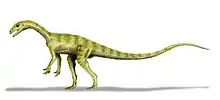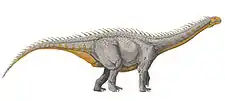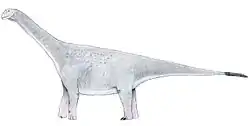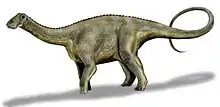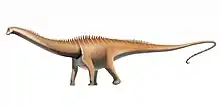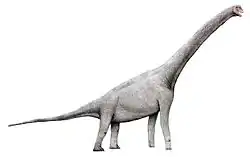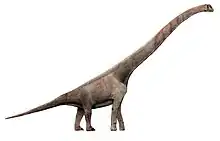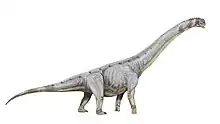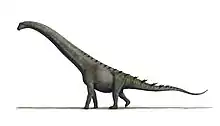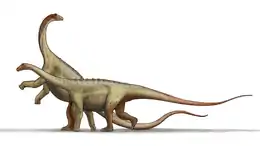Atlasaurus
Atlasaurus is a genus of sauropod dinosaurs from Middle Jurassic (Bathonian to Callovian stages) beds in North Africa.[2]
| Atlasaurus | |
|---|---|
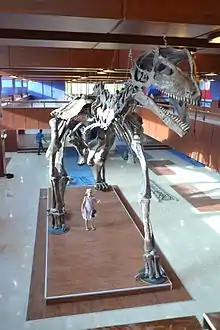 | |
| Skeleton mounted in Rabat, Morocco | |
| Scientific classification | |
| Kingdom: | Animalia |
| Phylum: | Chordata |
| Clade: | Dinosauria |
| Clade: | Saurischia |
| Suborder: | †Sauropodomorpha |
| Clade: | †Sauropoda |
| Clade: | †Eusauropoda |
| Genus: | †Atlasaurus Monbaron, Russell, & Taquet, 1999 |
| Species: | †A. imelakei |
| Binomial name | |
| †Atlasaurus imelakei Monbaron, Russell & Taquet, 1999 | |
| Synonyms | |
| |
Description
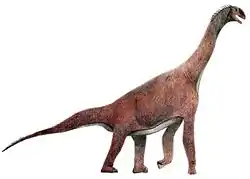
Atlasaurus differs from Brachiosaurus relative to the estimated length of the dorsal vertebral column (assuming 12 vertebrae, 3.04 m (10.0 ft)), in having a proportionately larger skull, a shorter neck (with at least 13 cervical vertebrae, shorter and more uniform in length than Brachiosaurus), a longer tail and more elongated limbs (humerus to femur ratio: 0.99; ulna to tibia ratio: 1.15). The teeth are spoon-shaped and have denticles. The lower jaw of Atlasaurus is about 69 centimetres (27 in) long, the neck was about 3.86 metres (12.7 ft) long, the humerus 1.95 metres (6 ft 5 in) long, and the femur about 2 metres (6 ft 7 in) long. It has been estimated at 15 metres (49 ft) in length, and 22.5 tonnes (22.1 long tons; 24.8 short tons) in weight.[2]
Discovery and naming
Atlasaurus was described by Monbaron, Russell & Taquet in 1999. It was named after the location of discovery in the High Atlas range of the Atlas Mountains of Morocco (where the Titan Atlas was said to hold up the heavens), and for the animal's size (about 15 m (49 ft) long). It is known from a nearly complete skeleton with a skull found at Wawmda, in the Middle Jurassic (Bathonian-Callovian) Guettioua Formation in Morocco's Azilal Province. The type species is Atlasaurus imelakei, the specific name coming from Arabic Imelake, the name of a giant.[2]
Classification
A relatively primitive sauropod identified as a "cetiosaur" when first discovered in 1981, Atlasaurus appears to be closer to Brachiosaurus than to any other known sauropod based on detailed similarities between the vertebral column and limbs.[2] However, more recent analyses have considered it to be a putative member of the Turiasauria.[3] The most recent analysis of turiasaurs recovers Atlasaurus as a brachiosaurid.[4]
References
- A. F. De Lapparent. 1955. Étude paléontologique des vertébrés du Jurassique d'El Mers (Moyen Atlas) [Paleontological study of the Jurassic veretebrates from El Mers (Middle Atlas)]. Notes et Mémoires du Service Géologique du Maroc 124:1-36
- M. Monbaron, D. A. Russell, and P. Taquet. (1999). Atlasaurus imelakei n.g., n.sp., a brachiosaurid-like sauropod from the Middle Jurassic of Morocco. Comptes Rendus de l'Académie des Sciences à Paris, Sciences de la Terre et des Planètes 329:519-526.
- Xing, L.; Miyashita, T.; Currie, P. J.; You, H.; Zhang, J.; Dong, Z. (2015). "A New Basal Eusauropod from the Middle Jurassic of Yunnan, China, and Faunal Compositions and Transitions of Asian Sauropodomorph Dinosaurs". Acta Palaeontologica Polonica. 60 (1): 145–154. doi:10.4202/app.2012.0151.
- Royo-Torres, Rafael; Cobos, Alberto; Mocho, Pedro; Alcalá, Luis. "Origin and evolution of turiasaur dinosaurs set by means of a new 'rosetta' specimen from Spain". Zoological Journal of the Linnean Society. doi:10.1093/zoolinnean/zlaa091.
